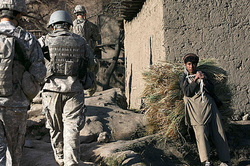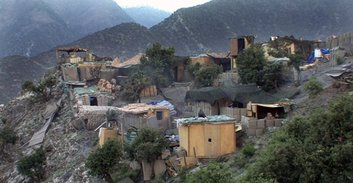
OP Restrepo
Restrepo is the outpost the troops out of the bestseller War of Sebastian Junger build up. Restrepo is not just their outpost but also their home.
Things you build by yourself are you favourite things because when you use them you could be proud of yourself. It’s like when you build up a tree house in the forest and the same night you sleep in there. You don’t sleep in there because it’s better to sleep than your own house you sleep in there because you’re proud on yourself and you want to feel how proud you can be on yourself. If you’re trying hard for something it needs to pay back and that’s why all the soldiers love the place of Restrepo. In the end it also got liked because after a time they started to like fights and Restrepo got more fire fights a day than the base.
Restrepo isn’t the most beautiful place on earth but it’s what people live in. It’s their home and because they built it up it’s one of the most beautiful places on earth for them.
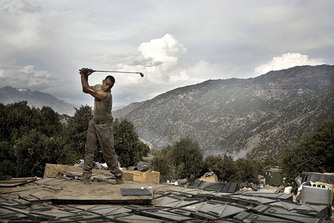
Practicing golf during a break in the fighting
In today's class, Mick and Mr. Brightman discussed the second part of Sebastian Junger's War. Since Sergio was not able to join us, we recorded our conversation for his benefit and for readers who are interested in following our progress through this unit. Good luck at OLMUN, Sergio! Enjoy...
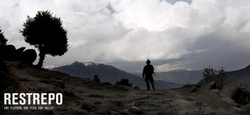
“One Platoon; One Valley; One Year” is the motto of the documentary “Restrepo,” directed by Tim Hetherington and Sebastian Junger. Probably one of the best documentaries ever made about American troops fighting against Taliban insurgents in remote Afghanistan. “Restrepo” is a chronological report of one year about Battle Company, which fights in Afghanistan´s most dangerous region, the Korengal Valley. Although it has a lot of things in common with Junger´s New York Times-Bestseller War, this documentary shows in a 93 minutes the courage, fear, and struggle of American soldiers in the Afghanistan war, as no other documentary has ever before.
During the film, the 2nd Platoon is ordered to defend an Observation Post (OP) named OP Restrepo, for Juan Sebastian Restrepo, a Colombian-born naturalized U.S. citizen platoon medic who was killed earlier during a fire fight. The film portrays the construction of the OP Restrepo advanced outpost, as well as the challenges and relentless firefights they faced while they managed to build the outpost from nothing in only one night. It also shows the challenges and decisions they have to face in order to target Taliban insurgents and not Afghan civilians, which often becomes a major problem. The film is a must-see because it also makes you think about the Afghan people and the consequences it has to their daily lives.
But one question remains: would you have the courage to fight in a place where one false step can become a catastrophe?
By Sergio Calderon
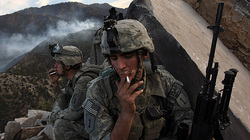
Sebastian Junger’s bestseller book War is one of the most popular and insightful books about the war fought by U.S. troops in remote Afghanistan. This book is trying to show the readers what war actually feels like, and tries to analyze every aspect of war. Junger’s story is a journey from the mental to the physical state of a soldier during open combat. It is a book that makes your heart beat as if you were on the middle of the fight, as well as it makes you reflect on the causes and damages of war on individuals.
For example, on the first chapters, Junger tries to explain and analyze the sense of fear. The fear that a soldier feels when they are in the middle of an ambush and adrenaline goes up so fast that their brain can almost operate, and your heart beats so fast you can’t even aim your rifle. The author also insists that being a soldier remains the ultimate challenge of character because it does not only need experience and strength, but also a strong personality and to stay focused.
Another example of strong personality and how a soldier gets so much into war that forgets his principles, is how a couple of soldiers start smoking due to stress. They say that even though they hate how cigarettes taste, they think it’s relaxing and drives the tension away for a while. This clearly shows how war can consume individuals up to the point where they have to break their own principles in order to survive.




